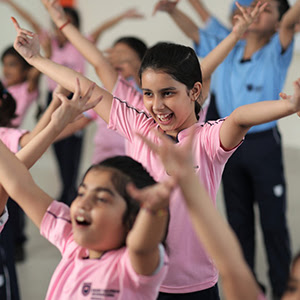The human brain is a very complex problem that changes with every new interaction as well as experience. Although this growth happens throughout our lives, its most rapid growth is observed when a child is between the age of 2 to 5. At this age, our brain gets influenced by environmental influences, learning experiences as well as emotional interactions. This fact has prompted many playschools in greater Faridabad to train their teachers so that they can engage the students with different preschool activities to improve their understanding skills and ensure accelerated emotional maturation and cognitive and social understanding.
How to improve executive functions in children
The prefrontal cortex of our brain controls
the neural network that deals with executive functions. These functions include
empathy, emotional self-awareness, focusing attention, goal-directed behaviors,
adaptability, and emotional self-regulation. To improve self-regulation in a
child it is important that the child practices it regularly and gets positive
feedback for taking their time before reacting. These decision-making skills
are impacted by their experience and feedback which in turn promote emotional
executive function response and social network skills.
Emotional
and social network development
As the children's executive function network
shows the development of numeracy, literacy, social, emotional, and academic
competence, they can intervene to enhance these networks in their early
childhood. Some of the ways through which a teacher can intervene to enhance
these neural networks in their early childhood are as follows.
You should converse with your students
and asked them to explain what they feel when they are stressed out. You should
tell them that when someone is emotionally disturbed then their brain reacts
very quickly therefore, they should first calm themselves. To calm themselves,
they can count to 10, employ deep breathing techniques, recreating optimistic
memories, and calming visualisations.
Teachers should encourage the students
to empathise with the character of a story by showing them the pictures of
different facial expressions and tell them the different emotions these
expressions imply. A child in his/her early years becomes aware of different
facial expressions, gestures, and actions of others. The child uses these cues
to interpret how the other person is feeling. Therefore, when a teacher helps
the child to identify the emotions that are shown through pictures, emojis, and
stories, they not only help the child to understand what the other person is
feeling but also allows them to interpret their own emotions. This allows them
to train themselves to keep calm before they take any action.
You can use guided play in which a
group of children plays act by taking the character of different people so that
they get an expanded perspective about different people and how they think.
Create
attention focus and goal-directed behavior
This skill is
important for children as it helps them to persevere even when they face
setbacks or challenges during their collaboration skills, developing literacy
skills, and improving emotional self-management.
Some of the top schools in Neharpar Faridabad that
spend their time, resources, and energy these preschool activities help their
students not only improve their academic performance but also help them improve
their emotional maturity.
Click For More Information: https://www.grandcolumbus.com/


Comments
Post a Comment